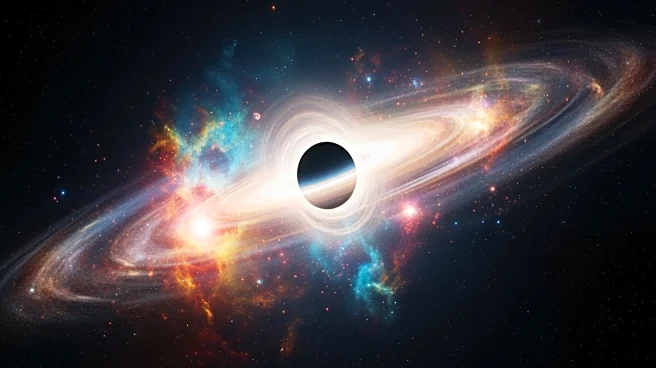What's Happening?
Astronomers have observed a tidal disruption event (TDE) involving a rogue black hole outside the central region of a galaxy, marking a first in astronomical observations. This event, named AT 2024tvd,
showcased rapidly changing radio emissions, indicating that supermassive black holes can exist and remain active far from galactic centers. The discovery was led by Dr. Itai Sfaradi and Prof. Raffaella Margutti from the University of California, Berkeley, with contributions from Prof. Assaf Horesh of the Hebrew University of Jerusalem. The event revealed the fastest-changing radio emission ever recorded from a black hole consuming a star, challenging existing theories about black hole behavior and their locations.
Why It's Important?
The observation of a TDE outside a galaxy's core is significant as it challenges the understanding of black hole locations and their activity. This discovery suggests that supermassive black holes can exist in unexpected places, potentially altering theories about galaxy formation and evolution. The rapid radio emissions provide new insights into the mechanisms of material release from black holes, indicating complex processes that occur over extended periods. This research enhances the understanding of black hole behavior and could influence future studies in astrophysics, contributing to the broader knowledge of cosmic phenomena.
What's Next?
The discovery was made possible through observations from several premier radio telescopes, including the Very Large Array and ALMA. The data revealed two distinct radio flares, suggesting delayed and complex processes in the aftermath of the stellar disruption. Detailed modeling points to separate ejection events, indicating that black holes can episodically reawaken after inactivity. This research, published in The Astrophysical Journal Letters, will likely lead to further studies on the behavior of rogue black holes and their impact on surrounding environments, potentially influencing future astronomical research and exploration.
Beyond the Headlines
The discovery of a rogue black hole outside a galaxy's core challenges existing theories about black hole locations and their activity. This could lead to a reevaluation of cosmic phenomena and influence the understanding of galaxy formation and evolution. The collaboration between international researchers highlights the importance of global cooperation in advancing astrophysical knowledge and exploring the universe's mysteries.









